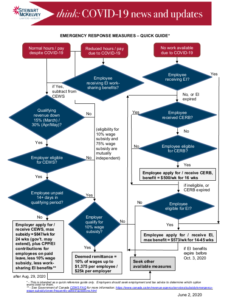Taking stock: Quick reference guide for government initiatives
*Flowchart below last updated June 2, 2020 (Originally published April 14, 2020)
With the passing of Bill C-14, the COVID-19 Emergency Response Act, No. 2 on April 11, 2020, the federal government has now laid a legislative foundation for various initiatives to assist employers and employees who are affected by COVID-19. The main measures include:
- The new Canada Emergency Response Benefit (“CERB”)
- The new Canada Emergency Wage Subsidy (“CEWS”), a 75% wage subsidy for eligible employers for the 12-week period beginning March 15, 2020
- The new 10% Temporary Wage Subsidy for employers
- Enhanced access to Employment Insurance (“EI”) benefits, including streamlining applications to the EI work-sharing program
Details on emergency response measures have shifted over the past few weeks, as they have evolved in response to our ever-changing situation. We expect this evolution will continue in many respects; notably, we are still awaiting regulations to further clarify some details related to CERB and CEWS.
However, given that the legislation now appears to be place, it seems an opportune moment for a fresh look at the current landscape of options. Recognizing it is a busy time, it is our pleasure to provide a dynamic summary of the mutual interactions between CERB, CEWS, EI and the 10% wage subsidy. We trust this will serve as a helpful reference point when seeking employment and tax advice to find the best options in the circumstances.
*Link to printable PDF version here.
This article is provided for general information only. If you have any questions about the above, please contact a member of our Labour and Employment group.
Click here to subscribe to Stewart McKelvey Thought Leadership articles and updates.
Archive
On April 1, 2016 New Brunswick’s Mortgage Brokers Act came into force, requiring businesses acting as mortgage brokerages or as mortgage administrators in New Brunswick to be licensed. A mortgage brokerage is a business that on behalf…
Read MoreIn May 2016, the Federal Court of Canada confirmed that copyright does not protect facts, even where a book’s author is clearly inspired by the content of a film (Maltz v. Witterick, 2016 FC 524 (CanLII)).…
Read MoreBy Jennifer Taylor “…firms of notaries or lawyers…must not be turned into archives for the tax authorities”1 So says the Supreme Court of Canada in one of two highly anticipated decisions on solicitor-client privilege, offering lawyers…
Read MoreJoe Thorne1 and Clara Linegar2 As joint owners of a business, what do you do when the business relationship falls apart? And what if one owner undermines the business in the process? In Smith v Hillier,3 Justice Paquette…
Read MoreThe Supreme Court of Canada has dismissed the appeals in Bruce Brine v. Industrial Alliance Insurance and Financial Services Inc.1 (with costs) and Luciano Branco, et al. v. Zurich Life Insurance Company Limited, et al.(without costs). Both of…
Read MoreOn May 4, 2016, the Nova Scotia Pooled Registered Pension Plans Act (“PRPP Act”) was proclaimed in force, and finalized Pooled Registered Pension Plan Regulations were released. While there were no major changes from the previously released draft regulations, the proposed rules…
Read MoreBy Level Chan and Dante Manna Pooled Registered Pension Plans (“PRPPs”) are closer to becoming a reality for Nova Scotian employers. PRPPs were established by the Federal government in an effort to address the lack of retirement savings…
Read MoreIn a case where there is a contributorily negligent plaintiff and two or more negligent defendants, can the plaintiff recover 100% of her damages from any of the defendants? The answer in Nova Scotia is…
Read MoreOn Friday, the Province of New Brunswick announced that it would not proceed at this time with the recently proposed changes to binding interest arbitration. The Province announced that a joint labour management committee will be struck to examine…
Read MoreOn March 29, 2016, the Province of New Brunswick tabled proposed changes to the Industrial Relations Act and the Public Services Labour Relations Act. If passed, these changes would dramatically alter well-established principles of private sector collective bargaining.…
Read More
